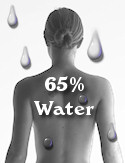Migraine Triggers: Dehydration
Dehydration is an often overlooked Migraine trigger. For some Migraineurs — and I’m one of them — even mild dehydration can trigger a terrible Migraine.
It’s unfortunate that dehydration is so often overlooked as a Migraine trigger because it’s usually easily avoided.
Part of the problem is that dehydration isn’t particularly well understood. Dehydration can occur in cold weather as well as during the summer, but too many people consider proper hydration only during the warmer months of the year.
 The human body is comprised of 65% water. In the simplest of terms, dehydration occurs as the result of excessive loss of water from the body; when we lose more water than we take in. Since we lose electrolytes as well, it’s a bit more complicated than that. That’s why we’ve seen such a proliferation of sports drinks on the market.
The human body is comprised of 65% water. In the simplest of terms, dehydration occurs as the result of excessive loss of water from the body; when we lose more water than we take in. Since we lose electrolytes as well, it’s a bit more complicated than that. That’s why we’ve seen such a proliferation of sports drinks on the market.
Some basics of dehydration:
- To replace the water our bodies lose in a 24-hour period takes an average of 64 to 80 ounces of fluids.
- Losing as little as 1 or 2% of body weight in fluid can result in dehydration.
- Losing as little as 3 to 5% can negatively impact concentration, judgment, and reaction time.
- Losing 9 — 15% results in severe, life-threatening dehydration.
- Under normal circumstances, the amount of water we need depends a great deal on our volume of perspiration and urine output.
- The body’s need for water increases under certain circumstances, including:
- increased physical activity;
- warmer weather or climate;
- living at higher altitudes;
- when fevered or experiencing vomiting or diarrhea;
- when we have a cold or the flu;
- if we have a chronic disease such as uncontrolled or untreated diabetes, cystic fibrosis, kidney disease, alcoholism, or adrenal disorders;
- while taking some medications (Always check your prescription information.); and
- during long air flights.
- There are also possible dietary contributors to dehydration including:
- salty foods,
- caffeine, and
- alcohol.
Possible symptoms of dehydration:
- Confusion
- Darker colored urine (should be nearly clear to pale yellow)
- Dizziness
- Excessive thirst
- Fatigue
- Headache
- Increased heart and respiration rates.
- Less frequent need to urinate and decreased urine output
- Muscle weakness
- Skin not snapping back when pinched and released
Children may exhibit additional symptoms of dehydration:
- Absence of tears when crying
- Fever
- Irritability
- Lethargy
- No wet diaper for three hours or longer
Treatment:
If dehydration is detected early, it can usually be treated at home, but a doctor should be consulted. Your doctor’s recommendations for treating dehydration may vary depending on the cause and severity of the dehydration, especially for children. Common treatments for dehydration include:
- Mild dehydration: rehydration by drinking fluids including sports drinks. In addition to fluid, these drinks provide electrolytes and salt. Products such as Pedialyte may be recommended for children as they also contain carbohydrates, which aid absorption in the intestinal tract. Caffeinated and alcoholic beverages should not be used for dehydration because caffeine and alcohol can be dehydrating.
- Moderate dehydration: rehydration may or may not be adequate. IV fluids may be needed.
- Severe dehydration: should be treated immediately as a medical emergency. Hospital treatment is required for IV fluids to rehydrate more efficiently and quickly and for observation.
Preventing dehydration:
Of course, it’s better to prevent dehydration than to need to treat it. Steps we can take to prevent dehydration include:
- Drink plenty of fluids, keeping those with alcohol and caffeine to a minimum.
- Eat foods high in water content. Fruit contains the most water, followed by vegetables.
- Drink fruit and vegetable juices in moderation. Drinking too much of them can cause diarrhea, which can be dehydrating.
- If planning a day with significantly more physical activity than usual or more exposure to heat and sun, begin hydrating a day before.
- Plan outdoor activities for cooler parts of the day.
- When organizing outdoor activities, choose places with shaded areas.
- Know your medications. If dehydration is a potential side effect of any of them, discuss preventing dehydration with your doctor.
- If ill, be sure to continue drinking fluids. Get additional fluids if you’re fevered, vomiting, or have diarrhea. Contact your doctor if fever, vomiting, or diarrhea persist.
Wrapping it up:
Recognizing and preventing dehydration are essential for good health and for preventing Migraines triggered by dehydration. Be sure to consider issues beyond drinking enough fluids. Remember that caffeine and alcohol can be dehydrating. If you take medications that can cause dehydration, be sure to compensate for them. If you tend to get dehydrated easily, discuss solutions with your doctor. Dehydration is an avoidable Migraine trigger.
Join the conversation